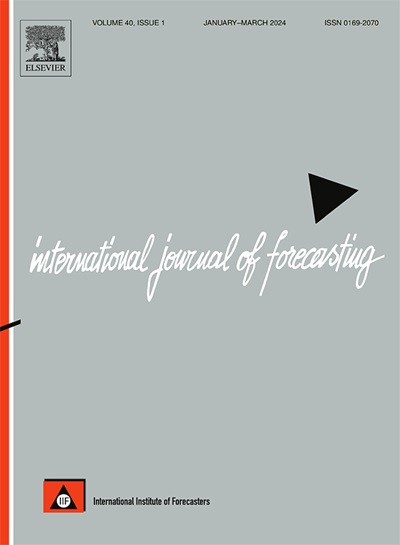Humans vs. large language models: Judgmental forecasting in an era of advanced AI
IF 7.1
2区 经济学
Q1 ECONOMICS
引用次数: 0
Abstract
This study investigates the forecasting accuracy of human experts versus large language models (LLMs) in the retail sector, particularly during standard and promotional sales periods. Utilizing a controlled experimental setup with 123 human forecasters and five LLMs—namely, ChatGPT-4, ChatGPT3.5, Bard, Bing, and Llama2—we evaluated forecasting precision through the absolute percentage error. Our analysis centered on the effect of the following factors on forecasters’ performance: the supporting statistical model (baseline and advanced), whether the product was on promotion, and the nature of external impact. The findings indicate that LLMs do not consistently outperform humans in forecasting accuracy and that advanced statistical forecasting models do not uniformly enhance the performance of either human forecasters or LLMs. Both human and LLM forecasters exhibited increased forecasting errors, particularly during promotional periods. Our findings call for careful consideration when integrating LLMs into practical forecasting processes.
人类vs.大型语言模型:先进人工智能时代的判断预测
本研究调查了人类专家与大型语言模型(llm)在零售业的预测准确性,特别是在标准和促销期间。利用123名人类预报员和5个llm(即ChatGPT-4、ChatGPT3.5、Bard、Bing和llama5)的控制实验设置,我们通过绝对百分比误差来评估预测精度。我们的分析集中在以下因素对预测者业绩的影响:支持的统计模型(基线和高级),产品是否在推广,以及外部影响的性质。研究结果表明,llm在预测准确性方面并不总是优于人类,而且先进的统计预测模型并不总是提高人类预测者或llm的表现。人类和法学硕士预报员的预测误差都有所增加,尤其是在促销期间。我们的研究结果要求在将法学硕士纳入实际预测过程时仔细考虑。
本文章由计算机程序翻译,如有差异,请以英文原文为准。
求助全文
约1分钟内获得全文
求助全文
来源期刊

International Journal of Forecasting
Multiple-
CiteScore
17.10
自引率
11.40%
发文量
189
审稿时长
77 days
期刊介绍:
The International Journal of Forecasting is a leading journal in its field that publishes high quality refereed papers. It aims to bridge the gap between theory and practice, making forecasting useful and relevant for decision and policy makers. The journal places strong emphasis on empirical studies, evaluation activities, implementation research, and improving the practice of forecasting. It welcomes various points of view and encourages debate to find solutions to field-related problems. The journal is the official publication of the International Institute of Forecasters (IIF) and is indexed in Sociological Abstracts, Journal of Economic Literature, Statistical Theory and Method Abstracts, INSPEC, Current Contents, UMI Data Courier, RePEc, Academic Journal Guide, CIS, IAOR, and Social Sciences Citation Index.
 求助内容:
求助内容: 应助结果提醒方式:
应助结果提醒方式:


